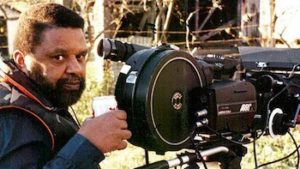
Joseph Wilcots
*Joseph Wilcots was born on this date in 1939. He was a Black Cinematographer.
From Des Moines, Iowa, Joseph Morrow Wilcots was the son of Henry Nathaniel Wilcots, a janitor at the Des Moines Register newspaper. As a child, Joseph’s father resolved a worker strike at the newspaper and became their business manager. His mother, May Wilcots, was an at-home mother from Chicago and a Registered Nurse.
From a family of fifteen children, the first incident that inspired his career in film occurred when he found a roll of film coming home from school at the age of six. He attempted to process it with warm water. It did not process; after tears with his mother, she took him to the library to learn the film development process. After a four-year stint in the Navy as a photographer, Wilcots worked four and a half years at Westheimer Co., a Hollywood optical house for which he was involved in providing visual effects for "Star Trek" and other TV series and commercials.
Wilcots was highly praised for his cinematography and his sensitivity to those he worked with. In 1966, he became the first Black to join Hollywood's camera operator’s union, the International Cinematographers Guild. For 15 years, he also worked on Michael Jackson's music videos, tours, and other projects, including Producing Michael Jackson's "Dangerous" Tour. As a director of photography, he achieved his most significant acclaim for "Roots," the 1977 rating phenomenon based on Alex Haley’s bestselling epic family saga.
Steven Poster, president of the International Cinematographers Guild, Local 600, said, "Joseph Wilcots could be considered the Jackie Robinson of cinematography," Describing Wilcots as "a kind and gentle man with amazing talent," Poster said Wilcots "loved the work he did and gained the respect he deserved throughout the industry."
In 1977, Wilcots received a national Emmy nomination for "outstanding cinematography in entertainment programming for a series" for Part Seven of "Roots." "Roots" executive producer David L. Wolper told The L.A. Times. "It's extremely difficult to photograph African Americans," Wolper said, "because when you shoot a scene with an African American and a white person standing next to each other, the lighting is so complex, and he was an expert in that. In doing a picture called 'Roots,' we felt it important that we should have an African American cinematographer," Wilcots’ work on "Roots" also earned him a local Emmy nomination. LeVar Burton, who played Kunta Kinte, the African abducted, in Roots, said: "What stands out immediately is that the look and feel of 'Roots' hold up today, in 2010; it does not feel dated at all."
Among Wilcot's other credits as a cinematographer are " Bill Cosby: Himself," "Where the Red Fern Grows: Part 2" and the TV series "Matlock," "Palmerstown, U.S.A." and "Brewster Place." Joseph Wilcots died on December 30, 2009, in Lancaster, California, from complications from a stroke. His wife, Annette; his son, Joseph Wilcots II; his daughter, London Morrow Wilcots; his sisters, Loretta Hall, Virgie Monroe, and Lois Newcomb; and his brothers, Michael and Henry Wilcots, survive him.